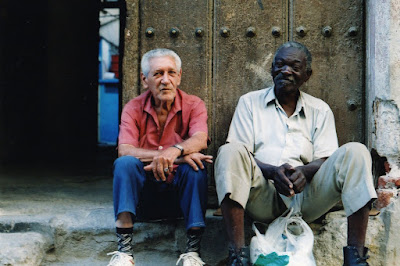
February 2004
Social Welfare
Cuba is a great country. A citizen is guaranteed for free medical health care for life. It's like the latest governmental health care system in the world. I'm not talking about expensive medical machines and clever insurance businesses tho. It's Cuba. Compared to the First World nations, they got short of commodities, right. So, what it means the latest in the world? It's a world famous, super practical health care system that is totally a fusion of Western and Eastern medicine.
It started in the end of 20th centuries when the Soviet Union became no longer a supplier for Cuba. Many of commodities and foreign products disappeared from Cuba. So the Cuban authorities were like "Oh, shaitze, what we gonna do for real, it's serious." Then, came to a resolution; send medical experts to China to learn the art of Eastern Medicine, like reflexology, acupuncture and herbal medicine.
Then they also brought back sort of philosophy. It was a fundamental idea; to treat and heal a cause so that a symptom will be gone automatically, instead of erasing the symptom instantly yet not resolving what a cause be.
...Unfortunately, medical systems around the world, as far as I know of, are mostly like that. You go see doctors and they give you a bunch of pills and other chemicals yet not even talk about possible causes. They may just say, "aright, here are cures. Take these pills everyday."
Going back about Cuba. In 2004, I alongside my Global College friends visited hospitals and clinics outside the capital city La Havana. I was so amazed how developed Cuban medical system was. They got all sort of treating/healing departments.
In addition, Cuban health care is free and local clinics are located everywhere. A number of doctors per citizens are the highest is the world, as they say. So the doctors can pay attention and find out illness from the early stages. This is really great. In our societies, extremely speaking money is the shaitze. In other words, if you got no money, you can't be sick, you can't have a baby, and life is like a hell if you got no money.
In Cuba, education is free too, even for foreigners if they want to learn medical science. Also a literacy rate is one of the tops in the America Continent. I even met a US college student in New York who studies medical science abroad in Cuba.
I somehow see that the traditional Eastern medicine in Japan isn't really familiar to many of us maybe because of the bias controled by... possibly mass-media and law enforcements manipulated by the US foreign policies on Japan. Looks like the huge power or the global history itself behind the scene plans everything and we are just a subordinate to the system, even the US government too.
Cuba is a great country. A citizen is guaranteed for free medical health care for life. It's like the latest governmental health care system in the world. I'm not talking about expensive medical machines and clever insurance businesses tho. It's Cuba. Compared to the First World nations, they got short of commodities, right. So, what it means the latest in the world? It's a world famous, super practical health care system that is totally a fusion of Western and Eastern medicine.
It started in the end of 20th centuries when the Soviet Union became no longer a supplier for Cuba. Many of commodities and foreign products disappeared from Cuba. So the Cuban authorities were like "Oh, shaitze, what we gonna do for real, it's serious." Then, came to a resolution; send medical experts to China to learn the art of Eastern Medicine, like reflexology, acupuncture and herbal medicine.
Then they also brought back sort of philosophy. It was a fundamental idea; to treat and heal a cause so that a symptom will be gone automatically, instead of erasing the symptom instantly yet not resolving what a cause be.
...Unfortunately, medical systems around the world, as far as I know of, are mostly like that. You go see doctors and they give you a bunch of pills and other chemicals yet not even talk about possible causes. They may just say, "aright, here are cures. Take these pills everyday."
Going back about Cuba. In 2004, I alongside my Global College friends visited hospitals and clinics outside the capital city La Havana. I was so amazed how developed Cuban medical system was. They got all sort of treating/healing departments.
In addition, Cuban health care is free and local clinics are located everywhere. A number of doctors per citizens are the highest is the world, as they say. So the doctors can pay attention and find out illness from the early stages. This is really great. In our societies, extremely speaking money is the shaitze. In other words, if you got no money, you can't be sick, you can't have a baby, and life is like a hell if you got no money.
In Cuba, education is free too, even for foreigners if they want to learn medical science. Also a literacy rate is one of the tops in the America Continent. I even met a US college student in New York who studies medical science abroad in Cuba.
I somehow see that the traditional Eastern medicine in Japan isn't really familiar to many of us maybe because of the bias controled by... possibly mass-media and law enforcements manipulated by the US foreign policies on Japan. Looks like the huge power or the global history itself behind the scene plans everything and we are just a subordinate to the system, even the US government too.






